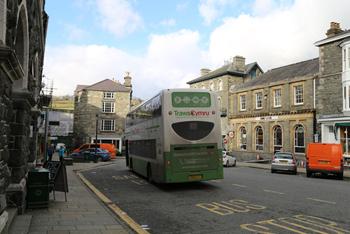The Welsh Government has announced a further bailout for the bus industry that it says will ‘rescue’ operators but also lead to public sector funders beginning to regain control of the industry.
Ministers said the new Bus Emergency Scheme (BES) will provide financial support for revenue lost during the Coronavirus pandemic in return for greater public control and a reversal of the deregulation of the industry seen in the 1980s.

Eldon Square, Dolgellau, Gwynedd
It was announced as the previous short-term support scheme – the Bus Hardship Fund – came to an end.
Additional expectations will be added to the requirements for funding that were put in place under the Bus Hardship Fund scheme:
- working with local authorities and Transport for Wales to flex routes and capacity to match evolving supply and demand
- use reasonable endeavours to comply with Welsh Government guidance on the safe use of public transport
- seeking financial support through all other grants available to them
- not increasing commercial bus fares
- providing information to help improve services for passengers
The Welsh Government said that in the longer term, supported by Transport for Wales and in collaboration with local authorities and bus operators, it would develop the BES to form the basis of a new funding scheme which will allow the more than £100m public contribution to bus operations ‘to better put the needs of passengers ahead of the needs of shareholders'.
'This will include a fairer and more consistent approach to fares, building patronage, and agreement to the principles of an Economic Contract and a Social Charter’.
Deputy transport minister Lee Waters said: ‘The coronavirus pandemic has led to passenger numbers falling by around 90%. It has therefore been necessary to take action and provide funding to secure the industry’s future.
‘This has meant buses have been able to help key workers get to work during the pandemic, and will mean the industry can continue to be an essential part of our transport network as we are hopefully in a position to ease restrictions and restart the economy.’
Mr Waters added: ‘As well as providing short-term funding with conditions that secure public value, I want the Bus Emergency Scheme to be the start of a pathway to a greater say for public sector funders and users reshaping our bus network in the interests of passengers across Wales.’
Government officials said revenue is expected to remain low ‘for the foreseeable future’ and that the emergency funding provides an operating subsidy in lieu of lost revenue, maintained at historic levels for an initial period of three months.
The aim is to deliver 'an integrated and flexible network to match supply to demand, flex services, and allocate any additional funding’ but operators must work with local authorities and Transport for Wales to determine service levels, the Welsh Government said.
‘This is the first stage of a wider plan which will see the public sector funders of the bus industry begin to regain control of buses for the first time since deregulation in the 1980s,’ a spokesperson added.
John Pockett, director of the Confederation of Passenger Transport Cymru, said: ‘We look forward to working with the Welsh Government to ensure communities have access to safe, clean and sustainable bus links and to understand how the proposed transition arrangements will impact on the number of bus services we can run and how quickly we can get more buses on our roads.’
Register now for full access
Register just once to get unrestricted, real-time coverage of the issues and challenges facing UK transport and highways engineers.
Full website content includes the latest news, exclusive commentary from leading industry figures and detailed topical analysis of the highways, transportation, environment and place-shaping sectors.
Use the link below to register your details for full, free access.
Already a registered? Login